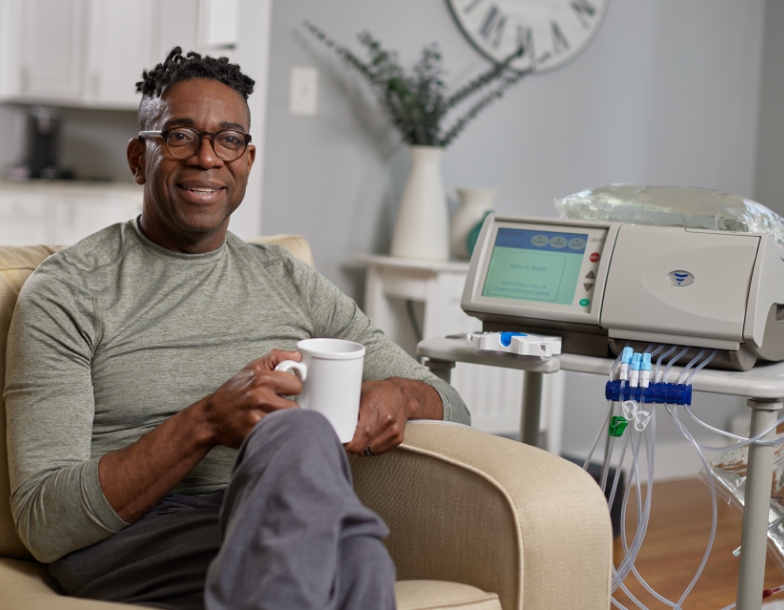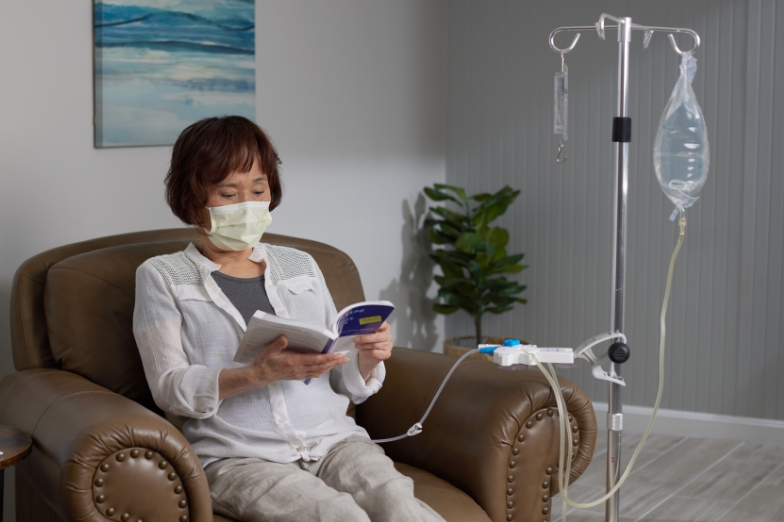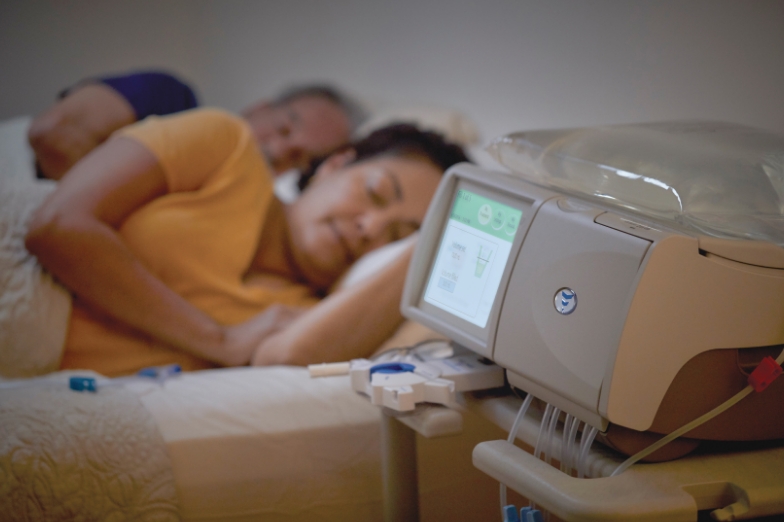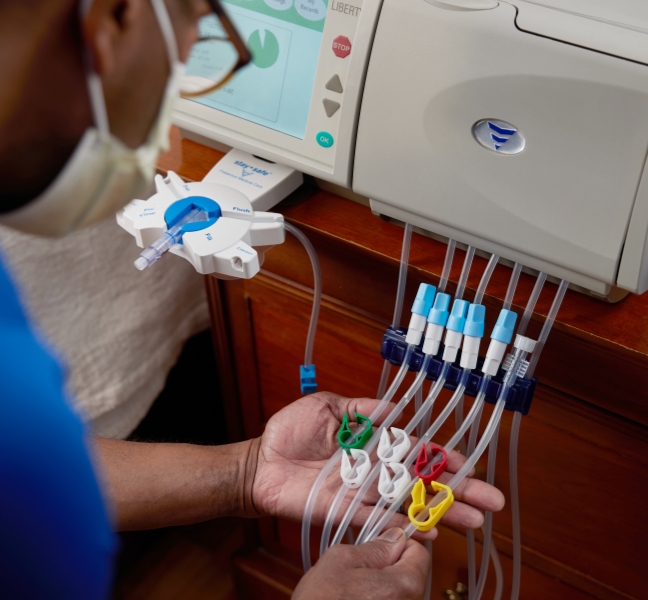Home Hemodialysis Customer Support: 866-697-8243
Peritoneal Dialysis Customer Support: 800-323-5188
Talk to a Patient Consultant About Home Dialysis: 888-200-6456
Home Hemodialysis Customer Support: 866-697-8243
Peritoneal Dialysis Customer Support: 800-323-5188
Talk to a Patient Consultant About Home Dialysis: 888-200-6456
Home Hemodialysis Customer Support: 866-697-8243
Peritoneal Dialysis Customer Support: 800-323-5188
Talk to a Patient Consultant About Home Dialysis: 888-200-6456
Home Hemodialysis Customer Support: 866-697-8243
Peritoneal Dialysis Customer Support: 800-323-5188
Talk to a Patient Consultant About Home Dialysis: 888-200-6456
What is Peritoneal Dialysis?
Peritoneal Dialysis (PD) uses the peritoneal membrane inside your abdomen as a filter to remove toxins and extra fluid from your blood. Typically, PD patients can perform therapy on their own—at home or almost anywhere. Generally, PD treatments are done daily, so waste and toxins in your blood don’t have a chance to build up as much between treatments.


PD/CCPD allowed me to do my treatment at home instead of in a dialysis center. This was important to me because it helped preserve my sense of independence and privacy, easing this life-changing process into my daily routine. I’ve now been doing PD for two years and have never regretted my decision.
Ken
Current PD patient and patient advocate


I can travel, go to concerts, work, and do everything I need to do to live my life. PD has allowed me to have my life back.
Maggie
PD patient
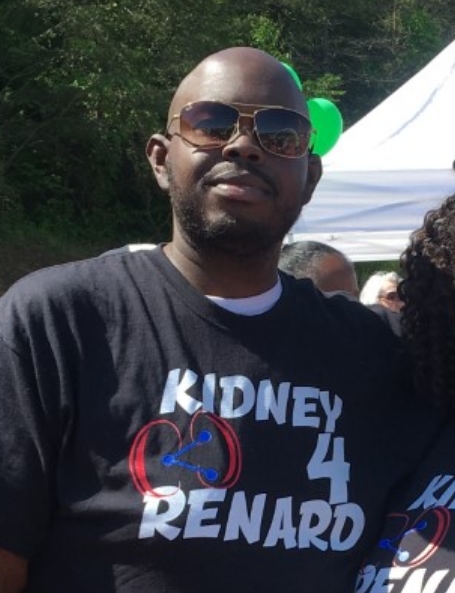

I called the Liberty ‘ole reliable.’ It just did what it was supposed to do.
Renard
Former PD patient, Now Transplanted


I was not going to be a passenger in this car called life. I had to get in the driver’s seat. It was time to take control of my life, and with PD I could and I did.
Roshanda
Former PD patient, Current Solo More Frequent HHD Patient and Patient Advocate
- Carousel Item 1
- Carousel Item 2
- Carousel Item 3
- Carousel Item 4
Many patients choose PD for the flexibility it brings, but how does it work?
PD uses blood vessels in the lining of your peritoneal cavity, called the peritoneum, to filter and clean your blood. PD solution is infused into your peritoneal (abdominal) cavity, either manually or using a PD machine called a cycler. The PD solution then absorbs waste, toxins, and excess fluid from your blood, which are removed when the dialysate is drained.
There are two types of PD therapy
The type of PD Therapy patients choose often depends on things like medical conditions, lifestyle characteristics, and personal likes and dislikes. Patients may start with one type of PD and switch to another later in their journey.
Continuous Ambulatory Peritoneal Dialysis
This type uses a disposable bag system. The patient performs manual exchanges which take around 20-30 minutes to complete, and are usually done 4-5 times per day. After a CAPD exchange is started, most people read, watch TV, or use their computer for 20-25 minutes during drain and fill. Between exchanges, normal activities can resume while the fluid dwells.
Automated Peritoneal Dialysis
APD includes several modality types, but the most commonly performed is called Continuous Cycling Peritoneal Dialysis (CCPD): This therapy uses a machine, like the Liberty® Select cycler, to automatically perform exchanges, typically while the patient is sleeping. The cycler is set up before bedtime and monitors the treatment. In the morning, the patient disconnects and normal activities are resumed.
Benefits Associated with PD Therapy
Compared to standard 3 times/week In-Center Hemodialysis
Why PD may be a good option for you
Peritoneal Dialysis (PD) allows for more control over your therapy and schedule to fit your lifestyle, increasing flexibility to perform treatments in the comfort of your home, at work, or while traveling. With PD, you won’t need to visit the clinic several times per week, which may open doors to more travel, hobbies, and activities with your friends and family.
PD Therapy Considerations:
- May be an option for patients with or without residual renal function
- The catheter is surgically placed so no continuous needle insertion is necessary
- Possibility of fewer dietary restrictions
- Possibility of better fluid management
- Machine not required (CAPD) making it a good choice for those facing mobility challenges or difficulty lifting heavy items
As with any important medical decision, getting a physician’s approval and advice is critical. You’ll want to be sure that PD fits your health requirements and lifestyle needs.
US-PD-000013 Rev A 08/2024
Indications for Use: The Fresenius Liberty Select Cycler is indicated for acute and chronic peritoneal dialysis
Caution: Federal (U.S.) law restricts this device to sale by or on the order of a physician
Note: Read the Instructions for Use for safe and proper use of this device. For a complete description of hazards, contraindications, side effects, and precautions, see full package labeling at fmcna.com.
REFERENCES
- François K, Bargman J. “Evaluating the Benefits of Home-Based Peritoneal Dialysis.” International Journal of Nephrology and Renovascular Disease, 7 (2014): 447.
- Sinnakirouchenan R, Holley JL. Peritoneal Dialysis Versus Hemodialysis: Risks, Benefits, and Access Issues. Advances in Chronic Kidney Disease, Vol 18, No 6 (November), 2011: pp 428-432.
- 2019 USRDS Annual Data Report Reference Tables I.15 & I.21: 2 year survival probabilities: incident hemodialysis / peritoneal dialysis patients, adjusted for age, sex, race, ethnicity, and primary cause of ESRD.
- Ronco C, Rosner MH, Crepaldi C (eds): Peritoneal Dialysis – State-of-the-Art 2012. Contrib Nephrol. Basel, Karger, 2012, vol 178, pp 251–257.
- Bonenkamp AA et al. Health-Related Quality of Life in Home Dialysis Patients Compared to In-Center Hemodialysis Patients: A Systematic Review and Meta-analysis. Kidney Med. Published online 2, 2020.
- Manera KE, Johnson DW, Craig JC, et al. Patient and caregiver priorities for outcomes in peritoneal dialysis multinational nominal group technique study. Clin J Am Soc Nephrol. 2019;14:74-83.
350 Merrimack Street
Lawrence, MA 01843
United States
350 Merrimack Street
Lawrence, MA 01843
United States
920 Winter Street
Waltham, MA 02451
United States
920 Winter Street
Waltham, MA 02451
United States
1-866-NxStage (697-8243)
1-866-NxStage (697-8243)
© 2025 Fresenius Medical Care. All Rights Reserved.
© 2025 Fresenius Medical Care. All Rights Reserved.

